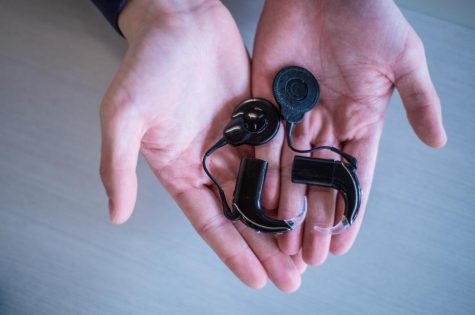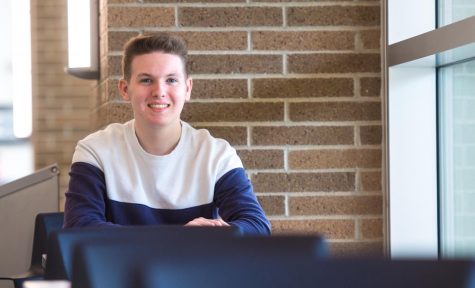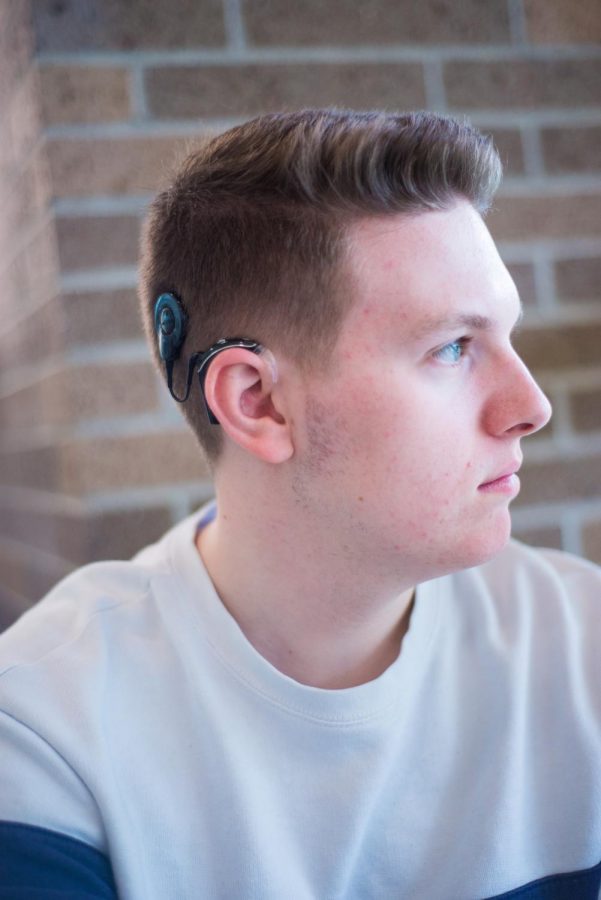GV student looks forward to audiology doctorate
Oct 22, 2019
October 2019 marks Audiology Awareness Month as Grand Valley State University plans to implement an audiology doctorate in Fall 2020. Robert Page, a junior, plans to study audiology; his interest comes from personal experience with hearing loss.
“I’ve never really have any memories of acoustic hearing, which is what would be normal hearing,” Page said.
Dr. Dan Halling, director of the audiology doctorate, said hearing loss ranges from mild to complete. Page said he lost all his hearing to meningitis at 13 months old. Come 18 months old, he underwent surgery for a cochlear implant.
Halling said, “Cochlear implants have really kind of revolutionized what we’re able to do with somebody that formerly would have been considered deaf.”
The surgery involves inserting a device into someone’s skull. From there, an electrode array is guided to the cochlea where electrodes are fired to stimulate nerve fibers, Halling said. In other words, electricity helps restore hearing, despite cochlea hair cells no longer working to generate sound.
Page described his hearing experience as like watching TV when someone turns on mute. Without cochlear implants, he cannot hear anything. He keeps the implant on most of the day, only taking it off when sleeping and swimming. An app even allows him to listen to music through his cochlear implants.
When first attending GVSU, Page said he started as a double major in accounting and finance. His choice of study was not entirely certain, so Page took a career class to explore other options beyond corporate work.
In WRT 150 for his general education requirement, he wrote three papers. One essay pertained to the history of cochlear implants while another covered Page’s life as a hard of hearing person. Page said he enjoyed those two papers more than his essay on economics, a foreshadowing of his shift to another career path.
Prior to college, Page attended Mason High School in the Lansing area. He recalled going with a teacher consultant to classes, and explaining his hearing loss and cochlear implants to students. In reflecting on high school, Page said he realized he enjoyed talking about his experiences.
“What I love about Grand Valley is that they give you a lot of hands-on experience,” Page said.

Page majors in Communication Sciences and Disorders (CSD), and he said he likes his major’s focus on hands-on learning as it reinforces lessons learned from class. For instance, Page utilized an audiometer to create audiograms. This experience involved doing hearing tests with air conduction and bone conduction.
Another project saw him record a language sample for a communication development class. The recording came about when Page talked to a preschooler for about 30 minutes to an hour. He then transcribed and analyzed the language sample. Page said the project was similar to the work of Speech-Language Pathology (SLP).
Page’s experiences extend beyond CSD classes since he volunteers for Deaf and Hard of Hearing Services in Kentwood, Michigan. The organization hosts American Sign Language (ASL) classes, and Page said he helps prepare packets and folders for the courses.
Deaf and Hard of Hearing Services also conducts community events for people with hearing problems. Page recalled volunteering last April when “Deaf Ninja” from American Ninja Warrior visited Grand Rapids and spent time with hard of hearing children. Subsequently, Page considered the visitor’s moment with the kids as a cool experience.
Page mentioned growing up without being around people his age who experienced hearing loss. Even today, he said the people with hearing loss he usually encounters are adults in their forties through sixties. He said hearing loss at these ages is related to disease, age and noise. By contrast, his experience is different, having lost hearing during childhood.
Halling noted that in part because of this, a lot of students and young adults are not exposed to the study of hearing loss.
“We’re a small profession, and a lot of people have never even heard of audiology,” Halling said.
According to the U.S. Bureau of Labor Statistics, 13,600 audiologists were employed in 2018. Halling explained audiologists help individuals who have hearing impairments or concerns, and their work includes checking people for dizziness.
Halling explained planning for GVSU’s audiology doctorate began in 2011 when the College of Health Professions looked at expanding its programs. He also said creating an audiology program speaks well for the university, as audiology students will go on to serve across West Michigan and the United States.
Furthermore, Halling mentioned his hope to deliver audiology services for students and faculty who might be faced with hearing difficulties.
While doctoral programs specify the coursework students must complete before applying, Halling said the audiology doctorate is different. It is organized in a way to attract people from different areas of science, so students studying such fields as biomedical science can apply.
Halling described the audiology curriculum as rigorous. The doctorate is a three-year program where students will spend each semester working with patients. Audiology students should be compassionate toward patients and advocate for their needs, Halling said.

The satisfaction of audiology comes from improving the lives of people who struggle with communication, Halling explained. He described communication as a huge part of life and quality thereof.
Even Page mentioned it is important to be accessible to individuals with hearing problems because they really want to hear messages. In case people do not know sign language, he recommended repeating the message or typing it on a phone. The key is being patient and putting forth the effort for people with hearing difficulties.























